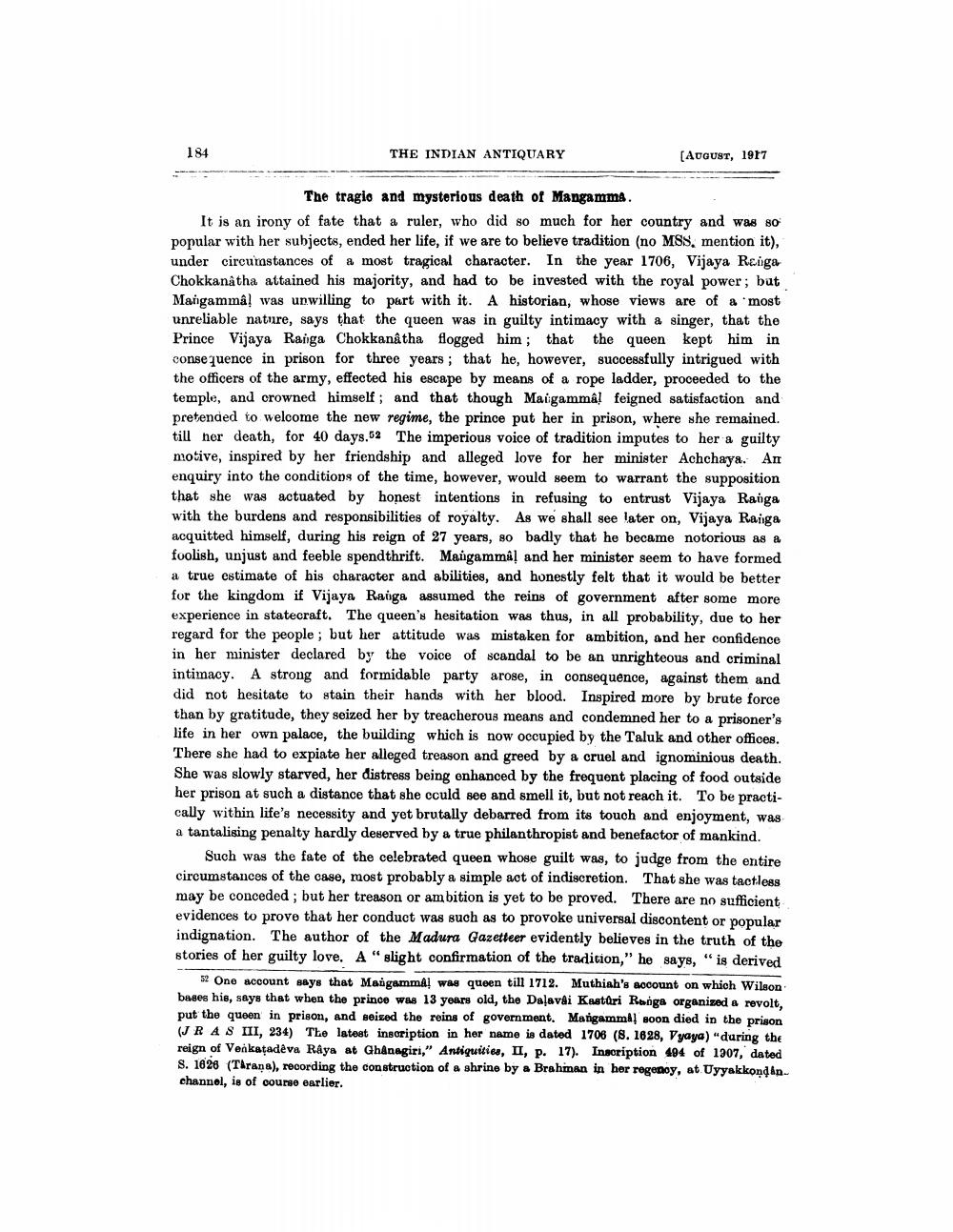________________
184
THE INDIAN ANTIQUARY
(AUGUST, 1917
The tragio and mysterious death of Mangamma. It is an irony of fate that a ruler, who did so much for her country and was so popular with her subjects, ended her life, if we are to believe tradition (no M88, mention it), under circumstances of a most tragical character. In the year 1706, Vijaya Raiga Chokkanatha attained his majority, and had to be invested with the royal power; but Mangamma! was unwilling to part with it. A historian, whose views are of a most unreliable nature, says that the queen was in guilty intimacy with a singer, that the Prince Vijaya Ranga Chokkanatha flogged him; that the queen kept him in consequence in prison for three years; that he, however, successfully intrigued with the officers of the army, effected his escape by means of a rope ladder, proceeded to the temple, and crowned himself; and that though Maigammal feigned satisfaction and pretended to welcome the new regime, the prince put her in prison, where she remained. till her death, for 40 days.62 The imperious voice of tradition imputes to her a guilty motive, inspired by her friendship and alleged love for her minister Achchaya. An enquiry into the conditions of the time, however, would seem to warrant the supposition that she was actuated by honest intentions in refusing to entrust Vijaya Ranga with the burdens and responsibilities of royalty. As we shall see later on, Vijaya Ranga acquitted himself, during his reign of 27 years, so badly that he became notorious as a foolish, unjust and feeble spendthrift. Maigamma! and her minister seem to have formed a true estimate of his character and abilities, and honestly felt that it would be better for the kingdom if Vijaya Ranga assumed the reins of government after some more experience in statecraft. The queen's hesitation was thus, in all probability, due to her regard for the people ; but her attitude was mistaken for ambition, and her confidence in her minister declared by the voice of scandal to be an unrighteous and criminal intimacy. A strong and formidable party arose, in consequence, against them and did not hesitate to stain their hands with her blood. Inspired more by brute force than by gratitude, they seized her by treacherous means and condemned her to a prisoner's life in her own palace, the building which is now occupied by the Taluk and other offices. There she had to expiate her alleged treason and greed by a cruel and ignominious death. She was slowly starved, her distress being enhanced by the frequent placing of food outside her prison at such a distance that she cculd see and smell it, but not reach it. To be practically within life's necessity and yet brutally debarred from its touch and enjoyment, was a tantalising penalty hardly deserved by a true philanthropist and benefactor of mankind.
Such was the fate of the celebrated queen whose guilt was, to judge from the entire circumstances of the case, most probably a simple act of indiscretion. That she was tactless may be conceded; but her treason or ambition is yet to be proved. There are no sufficient evidences to prove that her conduct was such as to provoke universal discontent or popular indignation. The author of the Madura Gazetteer evidently believes in the truth of the stories of her guilty love. A "slight confirmation of the tradition," he says, “is derived
52 One account says that Mangammal wag queen till 1712. Muthiah's account on which Wilson bases his, says that when the prince was 13 years old, the Dalavai Kasturi Ronga organized a revolt, put the queen in prison, and seized the reins of government. Mangammd soon died in the prison (JR A S III, 234) The latest inscription in her name is dated 1706 (8. 1628, Vyaya) "during the reign of Venkaçadeva Raya at Ghanagiri," Antiquities, II, p. 17). Inscription 494 of 1907, dated S. 1828 (Tirana), recording the construction of a shrine by a Brahman in her regenoy, at Uyyakkondan channel, is of course earlier.




